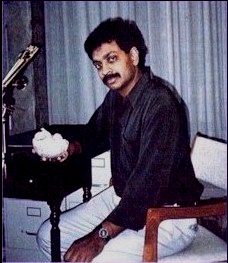Dr. Vilayanur S. Ramachandran
This 4 part BBC series The Human Face is described as
“Anthropology, psychology, cultural history, and biology provide key filters in this breezy but substantial exploration of the focal impact of the face. Produced by the BBC as a four-hour series and broadcast in the U.S. on the Learning Channel, The Human Face benefits from host, narrator, and cowriter John Cleese’s signature blend of erudition, enthusiasm, and wit.Along the way, Cleese presents information on the evolution of human facial features, the face’s role in sexuality (including the biological significance of ‘bedroom eyes’), communication through facial expressions, and the face’s essential role in defining identity. Ideals of physical beauty, the reasons why visual development and artistic expression focus on the face, and the nature of celebrity are examined, as are medical anomalies such as Mobius syndrome, a condition that eliminates the ability to smile.
The presenter gets strategic help from guest Elizabeth Hurley, who gamely lampoons her own celebrated beauty in various sketches, and Cleese’s fellow Monty Python alumnus Michael Palin, who pops up in Python-esque skits during the program’s fourth segment on fame. Comments from scientific sources are augmented by thoughtful interviews with Pierce Brosnan and Candice Bergen, who convincingly address the downside of being drop-dead gorgeous.”
Vilayanur S. Ramachandran, M.D., Ph.D., Hon DSc, Hon D was in the wonderful The Human Face, including being featured in a bonus interview on the special features disc. He is also Director of the Center for Brain and Cognition and professor with the Psychology Department and the Neurosciences Program at the University of California, San Diego, and Adjunct Professor of Biology at the Salk Institute. He trained as a Physician and obtained an MD from Stanley Medical College and subsequently a PhD from Trinity College at the University of Cambridge, where he was elected a senior Rouse Ball Scholar. His early research was on visual perception but he is best known for his work in Neurology.
Rama has received many honors and awards including election to Fellowship of All Souls College, Oxford, a honorary DSc (Doctor of Science, honoris causa) from Connecticut College, a honorary Doctorate from IIT, the John F. Streff Gold Medal from the Neurological Rehabilitation Society of America, a Gold medal from the Australian National University, the Ariens Kappers Medal from the Royal Netherlands Academy of Sciences for landmark contributions in neuroscience, and the presidential lecture award from the American Academy of Neurology. He is also a fellow of the Neurosciences Institute in La Jolla and a fellow of the Institute for Advanced Studies in Behavioral Sciences at Stanford. He was invited by the BBC to give the Reith Lectures for 2003, and is the first physician/experimental psychologist to be given this honor since the series was begun by Bertrand Russell in 1949.
In 1995, he gave the Decade of the Brain Lecture at the 25th annual (Silver Jubilee) meeting of the Society for Neuroscience and more recently, the Inaugural keynote lecture at the Decade of the Brain Conference held by NIMH at the Library of Congress and a public lecture at the Getty museum in Los Angeles. He also gave the first Hans Lucas Teuber lecture at MIT, the D.O Hebb lecture at McGill, the Rudel-Moses Lecture at Columbia, The Dorcas Cumming (inaugural keynote) lecture at Cold Spring Harbor, the Raymond Adams neurology grand rounds at Massachusetts General Hospital, Harvard, and the Jonas Salk memorial lecture, Salk Institute.
Rama is a trustee for the San Diego Museum of Art and has lectured widely on art, visual perception and the brain. He has published over 120 papers in scientific journals (including four invited review articles in Scientific American), is Editor-in-chief of the Encyclopedia of Human Behaviour and author of the critically acclaimed book Phantoms in the Brain that has been translated into eight languages and formed the basis for a two part series on Channel Four TV UK and a 1 hr PBS special in the USA. He is editor of the Encyclopedia of the Human Brain, contributed to Biology and Knowledge Revisited : From Neurogenesis to Psychogenesis, and authored The Emerging Mind and A Brief Tour of Human Consciousness : From Impostor Poodles to Purple Numbers. His work is featured frequently in the major news media including BBC, and PBS and Newsweek magazine recently named him a member of “The Century Club”, one of the “hundred most prominent people to watch in the next century”.
Some of his publications available for free download are Hearing Colors, Tasting Shapes, Synaesthesia — a Window Into Perception, Thought and Language, Autonomic responses of autistic children to people and objects, Bimanual coupling in amputees with phantom limbs, Mirror agnosia, Capgras syndrome: a novel probe for understanding the neural representation and familiarity of persons, and Behavioral and magnetoencephalographic correlates of plasticity in the adult human brain. Read the full list of his available free publications!
Watch many illusions and Rama’s explanation of what is happening in your brain as you watch them! Listen to his BBC Reith lectures Phantoms in the Brain, Synapses and the Self, The Artful Brain, Purple Numbers and Sharp Cheese, and Neuroscience – the New Philosophy. Watch him at IBM Almaden Institute’s 2006 “Cognitive Computing” conference (108.2 MB file with introductory speaker). Read his interview by All in the Mind!
